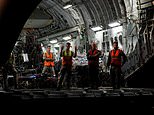Britain faces biggest terror threat in years, Boris Johnson is warned
Britain faces biggest terror threat in years, Boris Johnson is warned as PM calls on Taliban to stop Afghanistan becoming base for Islamist terrorists again
Former counter-terrorism adviser and commander in Afghanistan Richard Kemp said UK faced ‘greatest danger from terrorism since Islamic State at its height’The terror threat level is currently ‘substantial’ meaning a terrorist attack is likelyIt comes as Boris Johnson hinted Taliban could get diplomatic recognition if it stopped Afghanistan from turning into a base for Islamist terrorists once again
<!–
<!–
<!–<!–
<!–
(function (src, d, tag){
var s = d.createElement(tag), prev = d.getElementsByTagName(tag)[0];
s.src = src;
prev.parentNode.insertBefore(s, prev);
}(“https://www.dailymail.co.uk/static/gunther/1.17.0/async_bundle–.js”, document, “script”));
<!–
DM.loadCSS(“https://www.dailymail.co.uk/static/gunther/gunther-2159/video_bundle–.css”);
<!–
Former counter-terrorism adviser and commander of troops in Afghanistan Col Richard Kemp (pictured) said the UK faced the ‘greatest danger from terrorism since Islamic State was at its height’
Britain is facing the biggest terror threat in years, experts have warned Prime Minister Boris Johnson.
Former commander of British troops in Afghanistan Colonel Richard Kemp yesterday said the UK faced ‘the greatest danger from terrorism since Islamic State at its height’.
The threat could be bigger than that posed by ISIS and Britain faces an ‘extremely dangerous’ situation, he told Times Radio.
He said the Taliban ‘will allow and probably encourage jihadists to pour into the country from around the world, who plan, meet, prepare, train, organise and carry out strikes against the West from Afghanistan.’
The current threat level, which is determined by the Joint Terrorism Analysis Centre, is ‘substantial’ which means an attack is likely and is the third highest rating.
The levels above substantial are severe, which means an attack is highly likely, and critical which means an attack is highly likely in the near future.
Col Kemp previously urged the Government to raise the threat level to severe as he warned there is an ‘immediately increased threat from British jihadists inspired and motivated by events in Afghanistan’.
It comes as Boris Johnson urged the Taliban to prevent Afghanistan from becoming a base for Islamist terrorists.
Boris Johnson has said the Taliban could get diplomatic recognition if they ensure safe passage for those who wish to leave the country. Pictured: Cargo plane at RAF Brize Norton
Members of the British armed forces disembark a C-17 aircraft after landing at Brize Norton
Mr Johnson said on Sunday: ‘If the new regime in Kabul wants diplomatic recognition, or to unlock the billions that are currently frozen, they will have to ensure safe passage for those who wish to leave the country, to respect the rights of women and girls, to prevent Afghanistan from, again, becoming an incubator for global terror, because that would be disastrous for Afghanistan.’
Meanwhile, Tobias Ellwood, Tory chairman of the Commons defence select committee, warned that ‘terrorism will raise its ugly face again’ and that drone strikes would not defeat it.
A government source told the Sunday Times there was no intelligence suggesting Isis posed a greater threat to Britain as a result of the Taliban takeover of Afghanistan.
The source said that Isis-K was also opposed to the Taliban and there was ‘no evidence they have the capacity to launch attacks outside Afghanistan’s border’.
Foreign Secretary Dominic Raab and other officials are set to focus on future engagement with the Taliban in a bid to find an international consensus on how to deal with Afghanistan’s new regime.
A series of diplomatic meetings are planned for the coming days, after the UK pulled its final troops and diplomatic staff out of Afghanistan on Saturday.
Diplomatic sources suggested Mr Raab would be setting out how the response to the Taliban must be pragmatic and based on the group’s actions.
The Government has previously insisted that how the new regime in Afghanistan would be received and engaged with was a decision that had to be made in agreement with international partners.
Mr Raab will on Monday take part in a meeting with G7 counterparts, Nato, Qatar and Turkey.
He is expected to underline how Afghanistan must not become a haven for terrorists, and that stability in the region must be a priority.
The final UK troops and diplomatic staff were airlifted from Kabul on Saturday, drawing to a close a 20-year engagement and a two-week op to rescue UK nationals and Afghan allies
He will also stress the need to hold the Taliban to account on their human rights promises.
Top of the agenda is expected to be the Taliban’s promise to allow safe passage for foreign nationals and Afghans authorised to enter third countries.
It follows a statement from the UK and more than 90 other countries and organisations that said assurances had been received to this effect from the Taliban.
The Prime Minister’s special representative for Afghan transition, Sir Simon Gass, will also push the same messages in Doha.
The pledge is particularly important amid fears that the numbers of Afghans left behind who may be eligible for resettling was far higher than Government estimates.
On Saturday, chairman of the foreign affairs select committee and Tory MP Tom Tugendhat described the UK’s efforts to withdraw people from Afghanistan as a ‘sprint finish after a not exactly sprint start’.
On Sunday former head of the British Army General Lord Richard Dannatt said it was ‘unfathomable why it would appear that the Government was asleep on watch’.
‘We should have done better, we could have done better. It absolutely behoves us to find out why the Government didn’t spark up faster,’ he told Times Radio.
![]()


